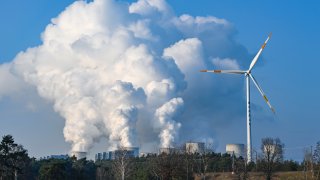
- The IEA says achieving net-zero target requires an "unprecedented transformation of how energy is produced, transported and used globally."
- Under its scenario, solar photovoltaic and wind will become the planet's leading sources of electricity before the end of this decade.
The world's pathway to developing an energy sector with net-zero emissions by the middle of the century is a viable but narrow one, the International Energy Agency said Tuesday.
In a statement released alongside the publication of a major new report, the Paris-based organization said achieving the net-zero target would require an "unprecedented transformation of how energy is produced, transported and used globally."
And, in a stark sign of how much work needs to be done, the IEA's report said current pledges fell "well short of what is necessary to reach net‐zero emissions globally by 2050."
Get a weekly recap of the latest San Francisco Bay Area housing news. Sign up for NBC Bay Area’s Housing Deconstructed newsletter.
According to the IEA's roadmap to net-zero, over 400 "milestones" will need to be achieved if the 2050 goal is to be met. These include scrapping new sales of fossil fuel boilers by 2025 and ending sales of new internal combustion engine cars by 2035.
In addition, from now on there should be "no investment in new fossil fuel supply projects, and no further final investment decisions for new unabated coal plants."
Under the IEA's scenario, solar photovoltaic and wind will become the planet's leading sources of electricity before the end of this decade, going on to account for almost 70% of generation by 2050.
Money Report
Solar, according to the IEA's roadmap, will become the planet's "single largest source of total energy supply" by the middle of this century. Fossil fuels, by contrast, will see their share "fall from almost four-fifths of total energy supply today to slightly over one-fifth."
And while jobs in "clean energy" will increase by 14 million in the period to 2030, roles in oil, gas and coal would fall by approximately 5 million.
"Our Roadmap shows the priority actions that are needed today to ensure the opportunity of net-zero emissions by 2050 — narrow but still achievable — is not lost," Fatih Birol, the IEA's executive director, said in a statement.
"The scale and speed of the efforts demanded by this critical and formidable goal — our best chance of tackling climate change and limiting global warming to 1.5 °C — make this perhaps the greatest challenge humankind has ever faced," Birol added.
The shadow of the Paris Agreement looms large over the IEA's report. Described by the United Nations as a legally binding international treaty on climate change, the accord aims to "limit global warming to well below 2, preferably to 1.5 degrees Celsius, compared to pre-industrial levels."
Cutting human-made carbon dioxide emissions to net-zero by 2050 is seen as crucial when it comes to meeting the 1.5 degrees Celsius target.
Later this year the COP26 summit will take place in the Scottish city of Glasgow. It's seen as a hugely significant event, with many hoping it will act as a catalyst for governments to step up their climate ambition in order to meet the targets set out in the Paris Agreement.
The reality on the ground shows just how challenging the IEA's roadmap is. Energy companies are still discovering new oil fields, for example, while in countries such as the U.S., fossil fuels continue to play a significant role in electricity production.
Preliminary figures from the U.S. Energy Information Administration show that natural gas and coal's shares of utility-scale electricity generation in 2020 were 40.3% and 19.3% respectively.
On the renewables front, the IEA is calling for a massive ramp up of installations over the coming years.
This would see annual additions of solar photovoltaic and wind power hit 630 and 390 gigawatts respectively by 2030, a massive undertaking that will need significant financial and governmental backing.
Among those reacting to the IEA's report was Joyce Lee, head of policy and projects at the Global Wind Energy Council, a Brussels-based industry body.
"This report is a blaring siren for governments across the world that they can no longer drag their feet and need to get serious about deploying renewables," she said.
"The scale of wind energy ramp-up needed to achieve net zero by 2050 is massive and can't be overstated," she added.






